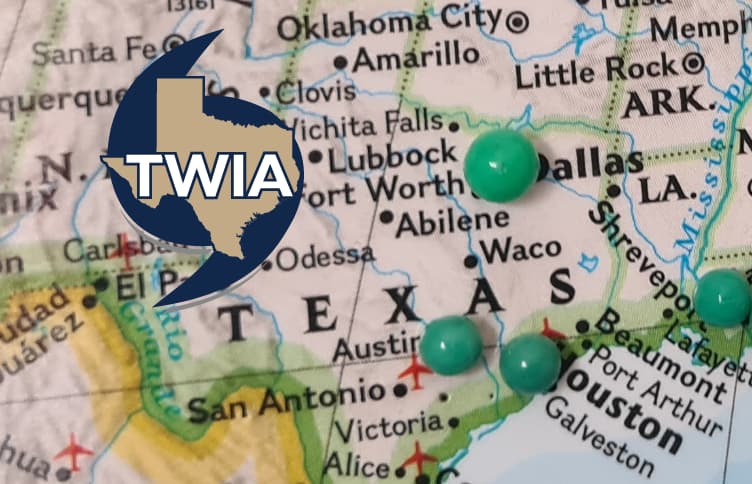TWIA to buy more reinsurance limit in 2024, as exposure soars

The Texas Windstorm Insurance Association (TWIA) expects to buy more reinsurance and risk transfer in 2024, as the not-for-profit wind and hail insurer of last resort for the state forecasts a significant increase in exposure, alongside a continued hard reinsurance market.
Recall that, back in May 2023, the Texas Windstorm Insurance Association (TWIA) secured reinsurance and risk transfer that was placed to the targeted $4.508 billion exhaustion level, with $1.2 billion of that coverage provided by its catastrophe bond program.
Within the TWIA reinsurance tower, catastrophe bonds made up a slightly larger component of whole than they did in prior years.
In total, TWIA’s 2023 reinsurance program consisted of $2.24 billion of reinsurance, with TWIA’s catastrophe bonds making up the larger share at $1.2 billion outstanding still, the rest being traditional reinsurance.
For 2024, when TWIA comes to begin its renewal process in the spring, the expectation currently is that the association will need to buy more reinsurance limit, albeit at a higher attachment point.
The reason TWIA is likely to have a higher attachment point for its reinsurance and risk transfer from mid-year 2024, which is when the renewal process completes each year, is that the funding from the Catastrophe Reserve Trust Fund (CRTF) has increased, which sits beneath the reinsurance layers.
As the CRTF grows, TWIA will benefit from buying reinsurance and cat bonds that begin attaching at a higher level, which will help it on cost a little.
But the association is expecting the global reinsurance market to remain firm through 2024, so is expecting its reinsurance costs to rise, driven by exposure growth.
Overall, TWIA is forecasting 28.2% annual exposure growth in total insured value (TIV) terms through 2024, so will need to buy reinsurance to support that expansion.
Direct exposures, or liabilities in force, are expected to be up 44% since the end of 2022.
The growth is both in policy count, but also in exposure and property values increasing, inflation being an important factor.
The projected cost, in terms of reinsurance deposit premiums paid to reinsurers for the 2023 tower, is estimated at this current stage to be $204.4 million. But the projection out to cover TWIA’s 2024 reinsurance needs, based on exposure forecasts and the expectations of continued hard market conditions, is 46% higher at $298 million.
TWIA CFO Stuart Harbour provided the Board of the association with some background to the reinsurance forecast for premiums TWIA will need to pay next year.
Commenting on the reinsurance market in general, Harbour said, “The hard market remains, as the reinsurers stay committed to improved terms and pricing. We have heard recently that there is more capacity and capital is returning to the market, but it is going to be a hard market all the way through 2024 and they expect it to be into 2025.”
Explaining how the figures the budget is based on were derived, Harbour commented, “The 2024 amount shown of $298 million reflects a rough estimate, calculated by computing the expected rate-on-line for each $100 million layer of reinsurance, the revised exposures and input from our reinsurance intermediary Gallagher Re as to the potential market conditions, based on current conditions and forecast.
“The growth in this estimate is primarily based on the increase in exposures, and assumes a relatively stable reinsurance market.”
On what this means, as well as the growth in the CRTF, Harbour continued, “We will have a higher attachment point for our reinsurance due to the growth in the CRTF, not considerably higher, but it will be higher.
“But the savings will be overshadowed by the additional amount of reinsurance limit that will be needed to cover the projected higher level for the 1-in-100 probable maximum loss (PML).”
Buying more reinsurance will clearly increase the cost, but the higher attachment should help to offset that slightly as rate-on-line falls the higher up the tower protection is secured.
This could also provide an opportunity for the catastrophe bond market, given the efficiency of capital markets capacity at the higher layers.
Harbour said that pricing will become clearer and that the end of year renewals will provide a better overview for how the reinsurance market is evolving.
“We’ll have a better idea of pricing after the January 1 renewals are complete, but indications are that the reinsurers are still committed to maintaining the firm pricing that we had,” he explained.
Adding that, “We are hearing that some capacity is returning to the market, which is encouraging.”
It’s important to note that TWIA’s Board will approve a budget for 2024 in December and that, even beyond that, discussions over forms of funding and use of reinsurance or catastrophe bonds will continue, so at this stage it’s not possible to speculate just how much more in the way of protection the insurer will buy next year.
You can read about all of TWIA’s Alamo Re catastrophe bonds it has ever sponsored in the Artemis Deal Directory.






